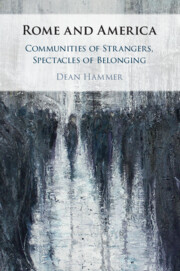Book contents
- Rome and America
- Rome and America
- Copyright page
- Dedication
- Contents
- Figures
- Preface
- Introduction
- Chapter 1 Memory, Identity, and Violence
- Chapter 2 Imagining Purity
- Chapter 3 The Wild Stranger and the Conquest of Space
- Chapter 4 Playing Culture
- Chapter 5 The Experience of Politics and the Crises of Two Republics
- Select Bibliography
- Index
Chapter 4 - Playing Culture
Combat Spectacles and the Acting Body
Published online by Cambridge University Press: 22 December 2022
- Rome and America
- Rome and America
- Copyright page
- Dedication
- Contents
- Figures
- Preface
- Introduction
- Chapter 1 Memory, Identity, and Violence
- Chapter 2 Imagining Purity
- Chapter 3 The Wild Stranger and the Conquest of Space
- Chapter 4 Playing Culture
- Chapter 5 The Experience of Politics and the Crises of Two Republics
- Select Bibliography
- Index
Summary
This chapter explores the spectacles of gladiators, bare-knuckle boxing, and the early theater. Wild, violent bodies were banned in Rome and America: the gladiator excluded from civic participation and protections; boxing matches banned through much of the nineteenth century. Both bodies were marked by wounds, but even more by a brashness and ruggedness that was contrary to standards of elite decorum. These bodies were the object of elite condemnation as uncivilized, uneducated, and unrefined. And these bodies were the object of the gaze, put on display to perform to the expectations of the audience. The problem is that boundaries of exclusion prove to be permeable. And these boundaries prove to be permeable because the lawless, uncivilized bodies replay the role of violence in constituting a founding identity. The conquest of wild, lawless nature in the name of civilization required a type of body, one that could act with similar violent wildness. To the chagrin of certain elites, the taboo body comes to be valorized, grafted and grafting itself onto the rugged origins embedded in the founding ideal.
Keywords
- Type
- Chapter
- Information
- Rome and AmericaCommunities of Strangers, Spectacles of Belonging, pp. 132 - 184Publisher: Cambridge University PressPrint publication year: 2023

